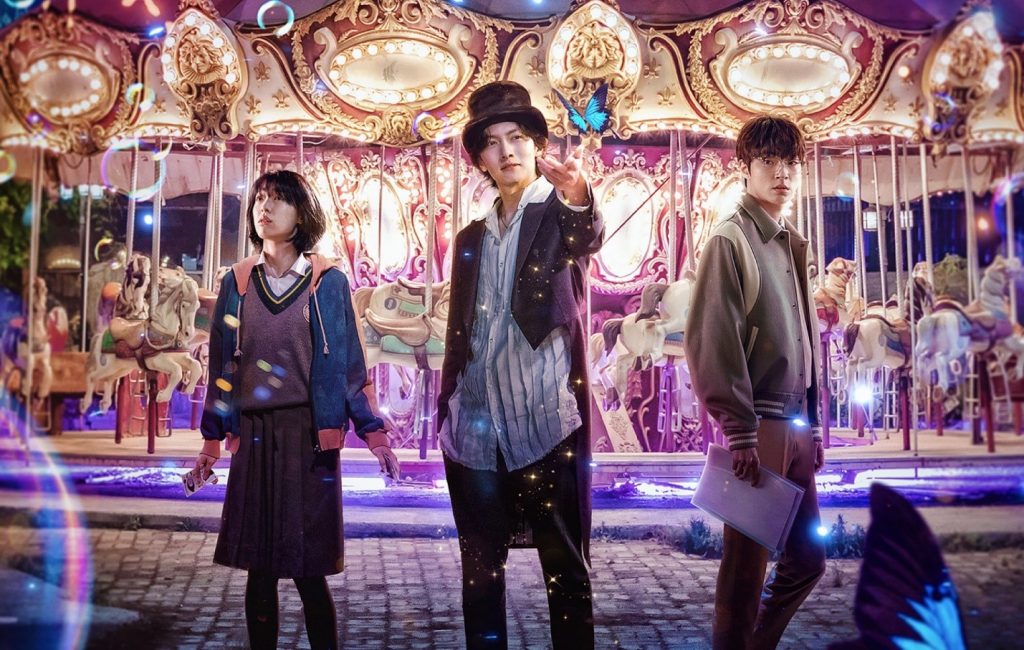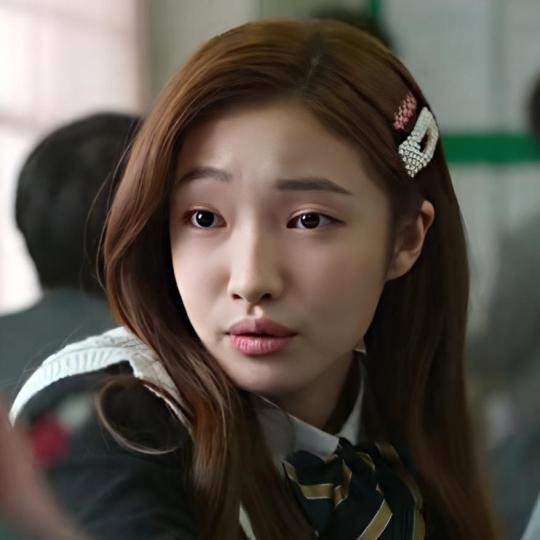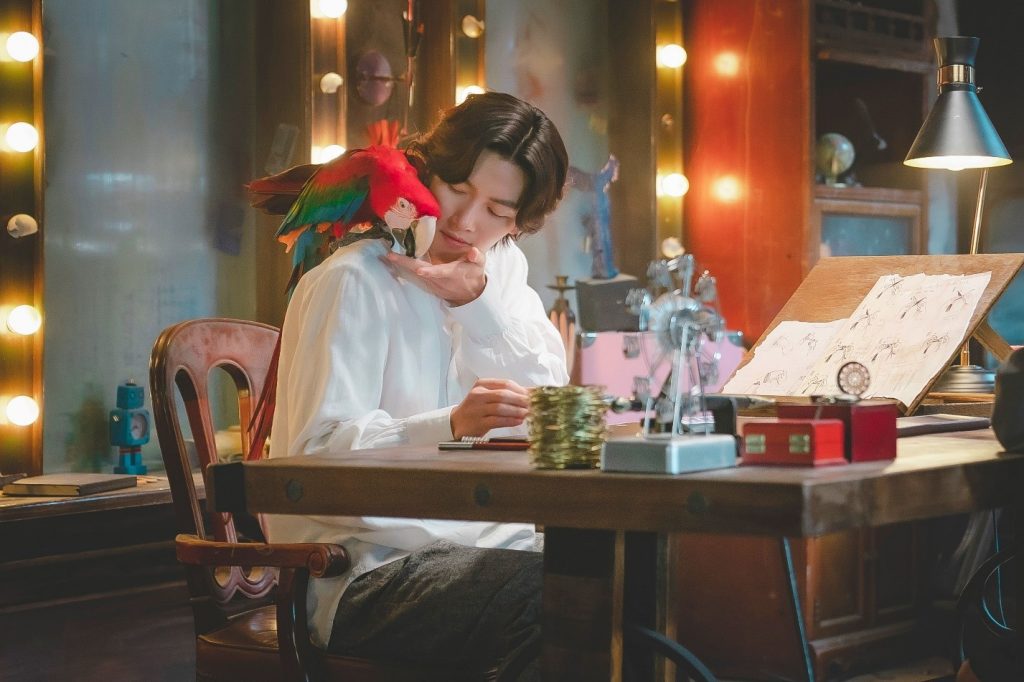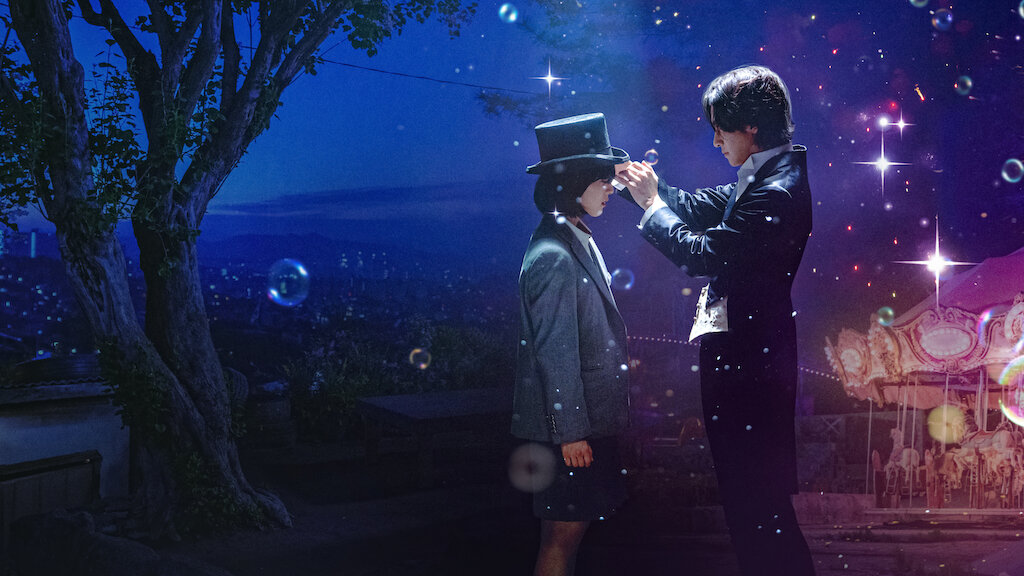
As one 2022’s most buzzworthy dramas, The Sound of Magic has plenty of promise. Based on the webtoon The Sound of Magic: Annarasumanara, the Netflix series sticks fairly close to the source material (minus Il-deung’s odd-shaped head), but it comes with complications as the story closes.
The Sound of Magic follows 17-year-old Yoon Ah-yi as she shoulders the pains of adulthood while attending high school. Abandoned by her mother and father— the latter of whom is on the run from loan sharks—Ah-yi is left to take care of her younger sister while trying to succeed in high school. Ah-yi must do odd jobs to afford rent, bills, and basic needs while managing her studies and harassment by her father’s debt collectors and landlord. At school, Ah-yi is picked on for her obvious poverty. One day, fate and money blowing in the wind leads her to an abandoned amusement park and her introduction to mysterious magician Ri-eul, a man subject to rumors and urban legends.
The series also follows 17-year-old Il-deung as he struggles to be the perfect son destined for greatness thanks to the path his parents laid out for him. Additionally, The Sound of Magic also has a side story involving a missing student Ha-yoon.
Penned as a musical drama, The Sound of Magic has a solid cast that carries the story’s duality well. Choi Sung-eun (Beyond Evil, Start-Up) delivers as Yoon Ah-yi. Choi embodies Ah-yi’s innocence, hopefulness, and despair. Regardless of the situation, Choi radiates a bright light that helps draw in the viewer.
Choi’s bright portrayal of Ah-yi is contrasted by the darker portrayals of Ri-eul/Minhyuk (Ji Chang-wook) and Il-deung (Hwang In-youp). Ji does well portraying the mysterious Ri-eul. Like Ah-yi, he, too, exudes hope through despair, but his portrayal is sullen and introspective.
Meanwhile, Hwang’s take on Il-deung is more closed off and much like the character in the original webtoon. Hwang, like Ji, does well portraying someone deeply troubled. While Hwang plays Il-deung much like the webtoon character, he does come across as too one-note at times, so it’s hard to buy him as someone who has a crush on Ah-yi, especially when he has self-serving tendencies.

Baek Ha-na (Ji Hye-won) is easy to dislike. Ji Hye-won plays the role well, but Ha-na is a stereotypical antagonistic high school female. She’s smart, callus, and sneaky, providing all the criteria that embody the schoolgirl bully archetype. Her disdain toward Ah-yi is strongly evident, and even when she does try to be helpful, she comes across as snarky and insincere.
Despite strong actors and characters, The Sound of Magic’s story is one that tries to cover too much in a span of six episodes. As a result, the story drops the ball to where it becomes a rushed, muddled mess at the end that leaves more questions than answers. That’s not to say that The Sound of Magic doesn’t have positive points as it does have those. However, trying to cram a lot of content into six episodes wasn’t a smart move on Netflix’s part. Extending the story to even eight or ten episodes may have helped wrap up the show in a way that could be satisfying for all audiences.
First, The Sound of Magic does a solid job blending fantasy and reality. The abandoned amusement park serves as a great backdrop for the characters as it was once a place of hope, fun, and joy. While the façade and crowds have faded, the dreary scenery has moments of brightness as Ri-eul takes Ah-yi on a journey to help brighten her spirits even though the amusement park, specifically the carousel, has sad memories attached.
There are several beautiful moments present as the story unfolds, especially the parts shown in the initial teaser trailer where Ri-eul fills the amusement park with fireworks to seemingly show Ah-yi the beauty of the world around her. These magnificent moments appear frequently to help move the plot and reflect how each of the main characters have more purpose and light in them than their current grinds.
Note: The following section contains spoilers for Ah-yi and Il-deung. Please skip ahead seven paragraphs if you don’t want spoilers.
At its heart, The Sound of Magic is about going against the grain and finding a place in this world even if it isn’t what society wants. This is where the drama shines even while focusing on the issues of sexual assault, suicide, self-harm, poverty, and mental illness.

For Ah-yi and Il-deung, the growth they experience feels realistic even though the duration’s compressed over six episodes. Ah-yi, who is already self-sufficient and capable, learns to find her own happiness. Some of the show’s most beautiful and meaningful moments stem from the conversations she has with her younger self. For anyone who ever grew up in a desperate situation, these scenes do touch the heart as Ah-yi tries to convince her younger self that everything will turn out okay (“Consolation”). When her past and present selves connect, the audience may feel a sense of yearning while Ah-yi reassures her younger self. These well-done scenes will linger in memory.
Meanwhile, Il-deung experiences exponential growth. Il-deung, who is seemingly emotionless throughout much of the series, has sparks of personality, especially where he imagines singing “I Mean It” to Ah-yi while sitting in a field. This scene is so sweet, magical, and pure! Il-deung’s soft-hearted, kind personality shows through.
However, Il-deung’s growth at the end of the series should earn Hwang In-youp some props! As indicated in several scenes in The Sound of Magic, Il-deung struggles with self-harm due to the increasing pressure to be perfect and follow the path his parents laid out for him. Il-deung’s often seen scratching and clawing at the back of his neck, leaving an open sore. The only times he doesn’t engage in this act is when he is learning and performing magic with Ri-eul. Il-deung learns to loosen up a bit, only to be thrown back into his sullen world whenever his parents throw their influence around. Anyone who grew up in a controlling household may sympathize with Il-deung, making him of the show’s most relatable characters.
Il-deung’s also involved in many of the show’s most emotionally charged scenes, which is why Hwang In-youp needs recognition. During “The Curse of Asphalt” scene when Il-deung realizes he is a slave to the grind and chasing the limelight, Hwang does an amazing job switching his emotions between anguish and the realizations his current path isn’t the one he desires. The facial expression subtleties enhance the scene. Il-deung’s internal struggle presents itself well here.
Hwang makes Il-deung’s internal struggles flourish more as the show progresses. Two other standout scenes featuring Il-deung involve his future self as well as his breakdown from his stress. These are showstopping moments since they sum up crumbling under society’s expectations and pressures. It’s a moment that viewers should pay attention to in an age where there is a better attempt at trying to shine a light on mental health.
However, there are times when Il-deung reacts jealously toward Ri-eul and Ah-yi’s friendship. Thanks to Ha-na’s influence, Il-deung believes Ri-eul and Ah-yi’s relationship to be romantic in nature. Il-deung takes to creeping around Ri-eul’s space and lurking around corners watching Ah-yi as if she is a possession instead of person. These moments, along with Il-deung’s treatment of Ah-yi while he pays her to do his schoolwork and to fail an exam make Il-deung a walking red flag at times. Unfortunately, these moments negate some of his positive developments.

Ri-eul (whose real name is Minhyuk) is the complex magic man behind Il-deung and Ah-yi’s transformations. When he’s introduced, he’s subject to Ha-na’s urban legends. Early in the story, not much is known about Ri-eul other than he lives in an abandoned amusement park with his scarlet macaw, Bella. He seems to know the Ah-yi and Il-deung need help and that they seem to be outsiders in their community much like he was when he was younger when he discovered he wasn’t meant to do what was expected of him. Slowly, Ah-yi and Il-deung learn more about Ri-eul, but it takes hearing the story from his high school friend for Ri-eul’s story to be heard.
Ri-eul’s story makes him a sympathetic character to some degree, especially since you can see pieces of his sad tale through Ah-yi and Il-deung’s current existences. Like Il-deung, Ri-eul was expected to be a perfect student and set out on a life laid out for him. Like Ri-eul when he was young, Ah-yi loses her sense of innocence and wonder. Ri-eul takes on a savior role to help Il-deung and Ah-yi not become like him when he was younger: People who lose their sense of self and all hope in order to fit into a pre-determined box. As Il-deung states, “Now I know. No one in this world is crazy. They make you into a crazy person little-by-little if you don’t fit into society standards” (Episode five, Curse of Asphalt).
The following section contains spoilers. Skip ahead eight paragraphs.
While the revelations into Ri-eul’s past provide insight into the character and how a suicide attempt shaped who he is today, the disclosures do leave more questions than answers.
Late in the show, it’s revealed that Ri-eul is a person of interest in Ha-yoon’s disappearance as well as another case in Seongmi. Then, there’s the elephant in the room regarding his actions against Ha-na that were dropped just as quickly as Ha-na did from the show’s finale!
While it is revealed that Ri-eul is not involved in Ha-yoon’s disappearance, the whole mention of him being considered in the disappearance of another girl did a vanishing act (much like Ri-eul did at the drama’s close!). This whole plot was odd at best considering how Ri-eul was angrier about accusations that his magic wasn’t real over being accused of being behind the disappearances of two high school girls. While the reaction does seem to be in line with Ri-eul’s overall character (he spends much of the drama trying to convince others his magic is, indeed, real), being questioned for other crimes seems to be too big of a revelation to drop.
Considering how the real culprit for Ha-yoon’s murder is caught, is it possible this same culprit is also the one responsible for the other disappearance? This individual also tried to sexually assault Ah-yi, so it could be plausible. However, how probable is it that this person happened to be in each place Ri-eul happened to live in to commit these crimes? This is just one of the issues with the overall plot. The storyline isn’t completed, and it’s never made clear if Ri-eul is innocent or guilty. How he doesn’t fight back against the allegations regarding the other disappearance could make some viewers think he might be involved. It is hinted at that he is on the run again, so it may make the audience wonder.
The show places a shadow on Ri-eul as flashback scenes show he has some deeper issues than what’s alluded to in his origin story (time at the hospital, time at a mental institution)., but the biggest issue is how he lashed out at Ha-na.
Granted, Ha-na is a character the audience will love to hate given her conniving personality. She sneaks around, bullies, and spies on people. Even when she tries to be sincerely concerned, she seems to have ulterior motives. However, it doesn’t excuse how Ri-eul reacts to Ha-na when he caught her wearing a camera when she came to visit him. In a pivotal scene, Ha-na goads Ri-eul, first by telling him she wanted to see magic but that she could see it in a theater and not at his place. She then confronts Ri-eul with video she took of him struggling with another person before telling him he’s crazy and his magic isn’t real. A struggle ensues and Bella gets injured. The attack on his magic causes Ri-eul to snap and he shows his rage by choking Ha-na. If it wasn’t for Bella’s squawks, Ri-eul may have killed Ha-na in his rage.
This is a massive issue The Sound of Magic glosses over. Despite a few mentions after the fact, there’s a suggestion the audience should get over this incident because Ri-eul believes his magic is real, he creates magic in the lives of Ah-yi and Il-deung and helps them find their way. Ri-eul’s character is ultimately romanticized and portrayed as a man wrongly accused of crimes and sympathetic because of his tragic backstory, but it doesn’t change how he attacked someone almost half his age because she accused him of being a con without real magic.
Yes, Ri-eul struggles with mental illness and feelings of inadequacy, but the actions here are inexcusable and shouldn’t be swept under the rug because of his seemingly kindly and helpful actions toward Ah-yi and Il-deung. While Ha-na is a character that provokes others, what happened to her shouldn’t be pushed under the magic carpet because the audience wants Ri-eul to be the good guy.
___
The Sound of Magic also covers the silencing of crime victims. This may be a theme that some viewers may miss, but it should be noted that Ah-yi, Ha-na, and Ha-yoon were silenced by the men that attacked them. In episode five, Ah-yi is silenced by the shopkeeper Doo-shik (Yoon Kyung-ho) when the police ask if she knows him. It appears she tries to tell the lead detective that Doo-shik attacked her, but he instead talks over her to where she can’t say anything. Ha-na is physically silenced, while Ha-yoon’s murder silences her permanently in exception of the little bit of magic that revealed what happened to her.
The show does too much to try to cover a lot of societal issues that occur globally but more heavily in South Korea. The ambition here should be commended, but The Sound of Magic could have been more successful in addressing these issues if it was longer than six episodes. There’s a lot to unpack, so it is a shame the show was so condensed.
Overall, there are solid characters despite the rockiness of the storyline. However, the issue regarding Ri-eul is problematic and one that’s not solved adequately. The message sent that he’s a protagonist is questionable at best, but it is a topic worth discussing.
The Sound of Magic earns a solid 3/5. It was a decent show, but the issues associated with it can’t be ignored.




